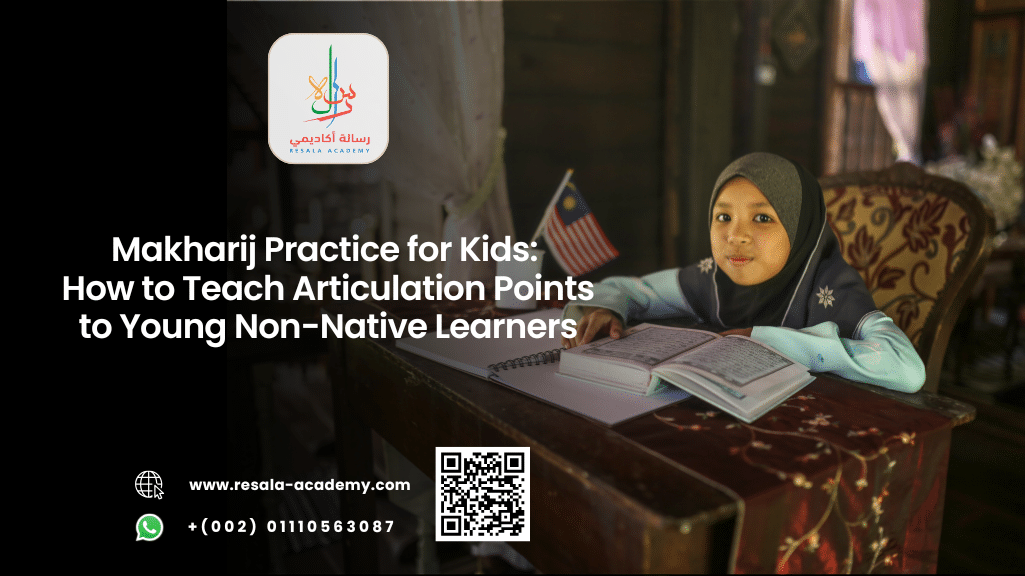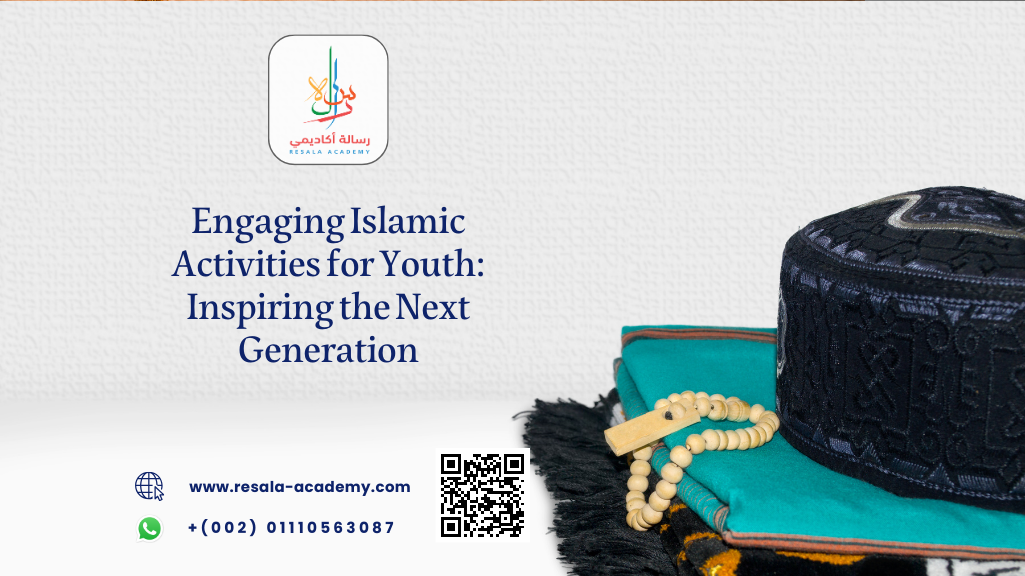Table of Contents
Makharij Practice for Kids: How to Teach Articulation Points to Young Non-Native Learners
Teaching Makharij (articulation points of Arabic letters) to children, especially young non-native learners, is a vital step in ensuring accurate Quranic recitation.
The correct pronunciation of Arabic letters is foundational for understanding and preserving the meanings of the Quran.
This article provides a comprehensive guide to teaching Makharij to kids, enriched with Quranic evidence, practical tips, and structured methods to make the learning process engaging and effective.
What Are Makharij?
The term Makharij (مخارج) refers to the articulation points of Arabic letters, or the specific places in the mouth, throat, and lips where sounds are produced.
Mastering Makharij is essential for proper Quranic recitation, as even slight mispronunciations can alter the meanings of words in the Quran.
The verse that underscores the importance of clarity in speech is:
الَّذِي عَلَّمَ بِالْقَلَمِ عَلَّمَ الْإِنسَانَ مَا لَمْ يَعْلَمْ
“Who taught by the pen, taught man that which he knew not.”
This verse reminds us of the divine gift of language and the responsibility to use it correctly, especially when reciting the Quran.
Why Is Teaching Makharij Important for Kids?
Teaching Makharij to children at an early age is crucial for several reasons:
- Preservation of Quranic Meaning: Mispronunciation can lead to a distortion of the Quran’s meaning. For example, confusing ق (Qaaf) with ك (Kaaf) can change the meaning of a word entirely.
- Spiritual Connection: Accurate recitation fosters a deeper connection to the Quran and its message.
- Lifelong Skill: Early mastery of Makharij ensures that children carry proper pronunciation into adulthood.
- Fulfillment of Divine Command: The Quran states:
إِنَّا نَحْنُ نَزَّلْنَا ٱلذِّكْرَ وَإِنَّا لَهُۥ لَحَـٰفِظُونَ
“Indeed, it is We who sent down the Quran, and indeed, We will be its guardian.”
- Teaching children proper recitation ensures they contribute to the preservation of the Quran.
Challenges of Teaching Makharij to Non-Native Learners
For non-native learners, teaching Makharij can be challenging due to:
- Unfamiliar Sounds: Arabic contains letters that do not exist in many other languages, such as خ (Khaa) and غ (Ghayn).
- Pronunciation Habits: Children may default to the sounds of their native language, leading to incorrect articulation.
- Limited Exposure: Non-native children may not hear Arabic sounds regularly, making it harder to replicate them.
Despite these challenges, with structured methods and consistent practice, children can learn Makharij effectively.
Quranic Evidence Supporting the Importance of Makharij
The Quran repeatedly emphasizes the importance of proper recitation and pronunciation:
وَرَتِّلِ الْقُرْآنَ تَرْتِيلًا
“And recite the Quran with measured recitation.”
This verse stresses the need for deliberate and precise recitation.
وَمَا يَنطِقُ عَنِ الْهَوَىٰ إِنْ هُوَ إِلَّا وَحْيٌ يُوحَىٰ
“Nor does he speak from [his own] inclination. It is not but a revelation revealed.”
This verse highlights the divine nature of the Quran, emphasizing the need for careful recitation.
قُرْآنًا عَرَبِيًّا غَيْرَ ذِي عِوَجٍ لَّعَلَّهُمْ يَتَّقُونَ
“An Arabic Quran, without any deviance, that they might become righteous.”
The Quran’s Arabic nature requires learners to master its unique sounds and articulation points.
وَلَقَدْ يَسَّرْنَا الْقُرْآنَ لِلذِّكْرِ فَهَلْ مِن مُّدَّكِرٍ
“And We have certainly made the Quran easy for remembrance, so is there any who will remember?”
This verse serves as a reminder that, with effort, learning the Quran—including its pronunciation—is achievable.
How to Teach Makharij to Kids: Step-by-Step Guide
1. Introduce the Concept of Makharij
Start by explaining what Makharij are and why they are important. Use simple language and visual aids to make the concept accessible to children.
Example Activity: Use a diagram of the mouth and throat to show where each letter is pronounced. This visual representation helps children understand the articulation points.
2. Group Letters by Articulation Points
The Arabic alphabet is divided into five main articulation points:
- Throat Letters
- Tongue Letters
- Lips Letters
- Nasal Letters
- Oral Letters
Teach one group at a time to avoid overwhelming the child.
3. Use Quranic Verses for Practice
Incorporate Quranic verses into practice sessions. This not only reinforces pronunciation but also connects children to the Quran.
Example Verse:
إِنَّا أَنزَلْنَاهُ قُرْآنًا عَرَبِيًّا لَّعَلَّكُمْ تَعْقِلُونَ
“Indeed, We have sent it down as an Arabic Quran that you might understand.”
Highlight specific letters and their articulation points within the verse.
4. Incorporate Interactive Tools
Children learn best through play and interaction. Use games and activities to make learning Makharij enjoyable.
- Flashcards: Create flashcards with letters and their articulation points.
- Apps and Videos: Use educational apps and videos designed for teaching Quranic recitation.
- Articulation Exercises: Encourage children to mimic the sounds by exaggerating the movements of their tongue, lips, and throat.
5. Provide Regular Feedback
Correct mistakes early and gently. Encourage children to try again when they mispronounce a letter.
6. Practice Daily
Consistency is key. Dedicate a few minutes each day to practicing Makharij. Short, regular sessions are more effective than long, infrequent ones.
The Role of Resala Academy in Teaching Makharij
Resala Academy is a trusted Academy for teaching Quranic sciences to non-native learners. Their expert instructors use innovative methods to help children master Makharij and Tajweed rules in the Online Tajweed Course. With personalized lessons and interactive tools, Resala Academy ensures that every child learns at their own pace.
Give Your Child the Gift of Accurate Quranic Recitation – Sign Up at Resala Academy!
Are you ready to help your child master the art of Quranic recitation?
At Resala Academy, we specialize in teaching Makharij and Tajweed to non-native learners. Our experienced instructors, engaging lessons, and proven methods make learning fun and effective.
Enroll your child today and give them the gift of accurate Quranic recitation!
FAQs
1. What is the best age to start teaching Makharij to children?
The ideal age to start teaching Makharij is around 4-6 years old. At this age, children are more receptive to learning new sounds and languages.
2. How can I help my child practice Makharij at home?
You can use flashcards, educational apps, and Quranic verses to practice Makharij at home. Consistency and positive reinforcement are key.
3. What are the common mistakes children make when learning Makharij?
Common mistakes include mispronouncing throat letters like ع and غ, and confusing similar sounds such as ض and ظ. Regular practice and feedback can help correct these errors.
4. Can non-native children learn Makharij as well as native speakers?
Yes, with the right guidance and practice, non-native children can master Makharij just as well as native speakers. Academies like Resala Academy are designed to help non-native learners succeed.
5. How long does it take for a child to master Makharij?
The time required depends on the child’s age, consistency of practice, and exposure to Arabic sounds. With daily practice, most children can master Makharij within a few months.
Conclusion
Teaching Makharij to kids, especially non-native learners, is a crucial step in helping them develop accurate Quranic recitation skills.
By focusing on the articulation points, using interactive tools, and incorporating Quranic verses into practice, children can master the correct pronunciation of Arabic letters. This not only preserves the meanings of the Quran but also strengthens their spiritual connection to it.
With the support of Academies like Resala Academy, parents, and teachers can ensure that children learn engagingly and effectively. Start this journey today and give your child the lifelong gift of proper Quranic recitation!




